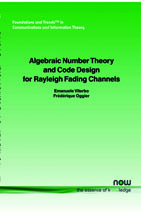Algebraic Number Theory and Code Design for Rayleigh Fading Channels
By F. Oggier, Institut de Mathématiques Bernoulli, École Polytechnique Fédérale de Lausanne, Switzerland, frederique.oggier@epfl.ch | E. Viterbo, Dipartimento di Elettronica Politecnico di Torino, Italy, viterbo@polito.it
Abstract
Algebraic number theory is having an increasing impact in code design for many different coding applications, such as single antenna fading channels and more recently, MIMO systems.
Extended work has been done on single antenna fading channels, and algebraic lattice codes have been proven to be an effective tool. The general framework has been settled in the last ten years and many explicit code constructions based on algebraic number theory are now available.
The aim of this work is to provide both an overview on algebraic lattice code designs for Rayleigh fading channels, as well as a tutorial introduction to algebraic number theory. The basic facts of this mathematical field will be illustrated by many examples and by the use of a computer algebra freeware in order to make it more accessible to a large audience.
Algebraic Number Theory and Code Design for Rayleigh Fading Channels
Algebraic number theory is gaining an increasing impact in code design for many different coding applications, such as single antenna fading channels and more recently, MIMO systems. Extended work has been done on single antenna fading channels, and algebraic lattice codes have been proven to be an effective tool. The general framework has been developed in the last ten years and many explicit code constructions based on algebraic number theory are now available.
Algebraic Number Theory and Code Design for Rayleigh Fading Channels provides an overview of algebraic lattice code designs for Rayleigh fading channels, as well as a tutorial introduction to algebraic number theory. The basic facts of this mathematical field are illustrated by many examples and by the use of computer algebra freeware in order to make it more accessible to a large audience. This makes the book suitable for use by students and researchers in both mathematics and communications.
